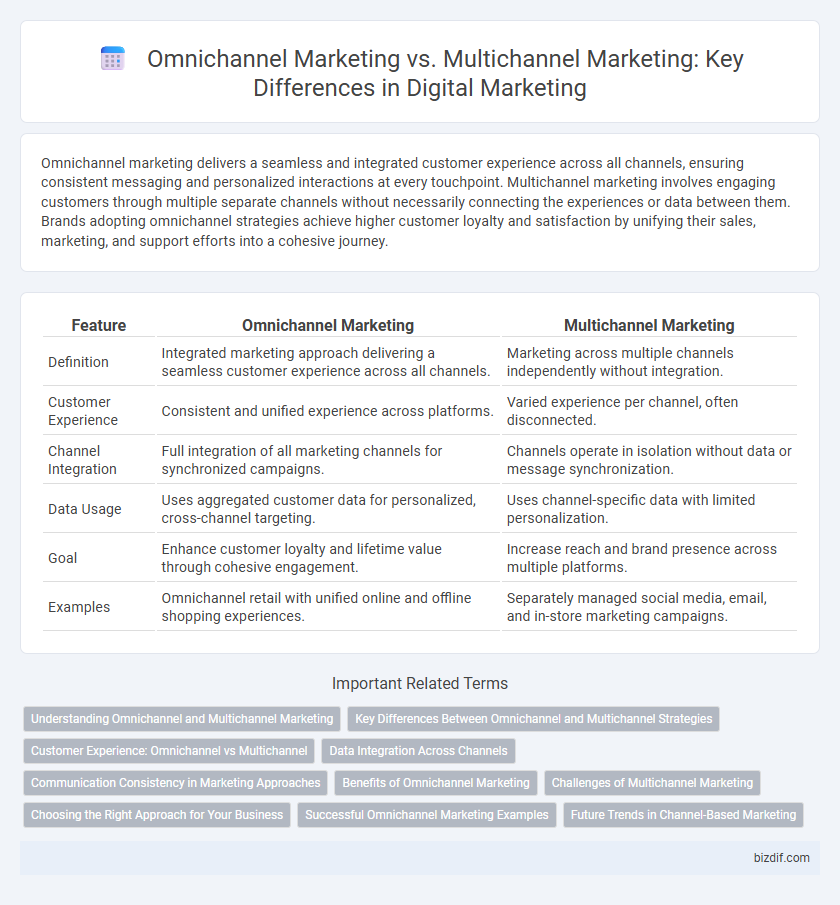Omnichannel marketing delivers a seamless and integrated customer experience across all channels, ensuring consistent messaging and personalized interactions at every touchpoint. Multichannel marketing involves engaging customers through multiple separate channels without necessarily connecting the experiences or data between them. Brands adopting omnichannel strategies achieve higher customer loyalty and satisfaction by unifying their sales, marketing, and support efforts into a cohesive journey.
Table of Comparison
| Feature | Omnichannel Marketing | Multichannel Marketing |
|---|---|---|
| Definition | Integrated marketing approach delivering a seamless customer experience across all channels. | Marketing across multiple channels independently without integration. |
| Customer Experience | Consistent and unified experience across platforms. | Varied experience per channel, often disconnected. |
| Channel Integration | Full integration of all marketing channels for synchronized campaigns. | Channels operate in isolation without data or message synchronization. |
| Data Usage | Uses aggregated customer data for personalized, cross-channel targeting. | Uses channel-specific data with limited personalization. |
| Goal | Enhance customer loyalty and lifetime value through cohesive engagement. | Increase reach and brand presence across multiple platforms. |
| Examples | Omnichannel retail with unified online and offline shopping experiences. | Separately managed social media, email, and in-store marketing campaigns. |
Understanding Omnichannel and Multichannel Marketing
Omnichannel marketing integrates multiple channels to create a seamless and consistent customer experience across online and offline touchpoints, increasing engagement and loyalty. Multichannel marketing uses various channels independently to reach customers, often resulting in fragmented messaging and customer journeys. Understanding the difference helps businesses optimize strategies for higher conversion rates and improved customer satisfaction.
Key Differences Between Omnichannel and Multichannel Strategies
Omnichannel marketing integrates all customer touchpoints into a seamless, cohesive experience, while multichannel marketing focuses on using multiple separate channels independently. Omnichannel strategies prioritize customer journey continuity across platforms, leveraging data synchronization and unified messaging. Multichannel approaches emphasize channel diversification without necessarily connecting user interactions, often resulting in fragmented customer experiences.
Customer Experience: Omnichannel vs Multichannel
Omnichannel marketing delivers a seamless and integrated customer experience by unifying all channels, allowing customers to switch effortlessly between devices and platforms while maintaining consistent interactions. Multichannel marketing offers multiple separate channels but often lacks synchronization, leading to fragmented customer journeys and inconsistent messages. By prioritizing omnichannel strategies, businesses enhance customer satisfaction, loyalty, and lifetime value through cohesive and personalized experiences.
Data Integration Across Channels
Omnichannel marketing excels in data integration by creating a unified customer view that seamlessly connects interactions across all digital and physical touchpoints, enhancing personalized experiences. Multichannel marketing often operates in silos, where data from separate channels like social media, email, and in-store purchases remain fragmented, limiting cross-channel insights. Leveraging centralized data platforms in omnichannel strategies improves targeting accuracy and boosts overall campaign effectiveness through cohesive customer journey analysis.
Communication Consistency in Marketing Approaches
Omnichannel marketing ensures communication consistency by delivering a unified brand message across all channels, creating a seamless customer experience. In contrast, multichannel marketing often results in fragmented messaging as each channel operates independently. Consistent communication in omnichannel strategies enhances brand recognition and customer trust, driving higher engagement and conversion rates.
Benefits of Omnichannel Marketing
Omnichannel marketing enhances customer experience by delivering a seamless and consistent interaction across all digital platforms, increasing engagement and satisfaction. By integrating data from various touchpoints, it allows for personalized messaging that drives higher conversion rates and customer loyalty. Businesses adopting omnichannel strategies see improved analytics and better resource allocation, resulting in optimized marketing ROI and sustained growth.
Challenges of Multichannel Marketing
Multichannel marketing faces challenges such as fragmented customer experiences and inconsistent messaging across diverse platforms, which can hinder brand coherence and reduce engagement rates. Managing separate channels without integration often leads to inefficient data collection and analysis, limiting insights into customer behavior. These difficulties make it harder to deliver personalized and seamless interactions compared to omnichannel marketing strategies.
Choosing the Right Approach for Your Business
Omnichannel marketing integrates customer experiences across all channels, ensuring consistent messaging and seamless transitions, while multichannel marketing focuses on engaging customers through multiple independent platforms. Choosing the right approach depends on your business size, customer behavior, and resource capacity, with omnichannel offering deeper personalization and multichannel providing broader reach. Prioritize omnichannel marketing for enhanced customer loyalty and data-driven insights, or multichannel marketing to diversify touchpoints and increase brand awareness.
Successful Omnichannel Marketing Examples
Successful omnichannel marketing exemplifies seamless integration across customer touchpoints, enhancing user experience and driving higher engagement. Brands like Starbucks utilize real-time data to unify mobile app, in-store, and online interactions, resulting in personalized offers that boost customer loyalty. Unlike multichannel marketing, omnichannel strategies ensure consistent messaging and fluid transitions, significantly improving conversion rates and lifetime customer value.
Future Trends in Channel-Based Marketing
Future trends in channel-based marketing emphasize seamless integration across platforms, with omnichannel marketing providing a unified customer experience through consistent messaging and personalized interactions. Advanced data analytics and AI-driven insights enable marketers to predict consumer behavior and optimize engagement in real-time across all channels. Investments in emerging technologies like augmented reality and voice search are expected to further enhance omnichannel strategies, surpassing traditional multichannel approaches in driving customer loyalty and revenue growth.
Omnichannel Marketing vs Multichannel Marketing Infographic

 bizdif.com
bizdif.com